|
|
|
Sort Order |
|
|
|
Items / Page
|
|
|
|
|
|
|
| Srl | Item |
| 1 |
ID:
165534
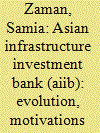

|
|
|
|
|
| Summary/Abstract |
China-led Asian Infrastructure Investment Bank (AIIB) was launched in 2016. Prior to that, the leadership and authority of the Multilateral Development Banks (MDB) were mainly controlled by the United States (US), Western Europe and Japan. Now the world has been experiencing the emergence of a new player in this domain, China. The China-led AIIB has sparked a major debate over China’s motivations behind establishing the Bank and the geostrategic implications of the Bank for both regional and extra-regional actors. Therefore, the paper endeavours to understand why China has created the AIIB. It also explores the geostrategic implications of the Bank for the region and beyond. Finally, the paper addresses certain challenges which the Bank needs to address to be a fullfledged MDB.
|
|
|
|
|
|
|
|
|
|
|
|
|
|
|
|
| 2 |
ID:
167327
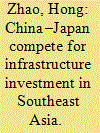

|
|
|
|
|
| Summary/Abstract |
As the two most significant Asian powers, competition in infrastructure sectors in Asia between China and Japan is inevitable. Japan is a long-established developer of regional infrastructure in Southeast Asia, while China’s interest in financing and building infrastructures there is relatively recent. After China proposed the Belt and Road Initiative (BRI) and the Asian Infrastructure Investment Bank (AIIB), Japan stepped up its efforts, determined to expand its already well-established influence. This competition has had positive as well as negative consequences for Southeast Asia and regional financial architecture. This article attempts to use Sino–Japanese competition for infrastructure financing and high-speed railway contracts as a case in point to explore in what ways and trajectory these two countries’ competition for infrastructure investment is going on, and what impacts it will create on the region.
|
|
|
|
|
|
|
|
|
|
|
|
|
|
|
|
| 3 |
ID:
161564
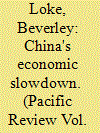

|
|
|
|
|
| Summary/Abstract |
China's spectacular economic growth over the past decades has given rise to a more confident and proactive China in global governance. China is now an institution-builder, with new Chinese-led institutions such as the Asian Infrastructure Investment Bank designed to cement Beijing's central role in global economic governance. What, then, are the potential implications of a slowing economy for China's institutional power and global governance role? This article locates China's economic growth and slowdown in broader discussions about China's global position and questions about responsibility, order and governance. It argues that China's economic slowdown will not result in a drastic impact on Beijing's institutional power as there are key material, historical and ideational drivers at play here. Unless China is confronted with the prospect of an economic collapse, it will continue to pursue an active institutional role, speak the rhetoric of South–South solidarity with emerging economies and seek a leadership role in reforming global economic governance, even with a slowing economy, because this is intrinsically tied to its identity and how China now positions itself in an evolving global order.
|
|
|
|
|
|
|
|
|
|
|
|
|
|
|
|
| 4 |
ID:
172829
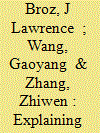

|
|
|
|
|
| Summary/Abstract |
We analyze the factors that increase the likelihood that other nations will follow China's global economic leadership. While our theoretical framework incorporates the conventional argument that China pulls in followers with economic benefits, we focus on grievances with the current global order that have the effect of pushing countries toward the rising new leader. We find that grievances about global financial instability are particularly important push factors. Our results show that countries that have experienced more financial crises, more variable capital account policies, more volatile portfolio capital outflows, and more social unrest during IMF programs are more likely to support China's global leadership than leaders of nations that have been less exposed to these problems. We find no evidence that grievances about global governance, or grievances about discriminatory US trade policies, are related to foreign support for China's global economic leadership. Overall, our evidence is consistent with the interpretation that leaders want to reform and preserve the WTO and the IMF, which have worked reasonably well for them under US leadership. At the same time, they have incentives to follow China's economic leadership on global capital flows, emphasizing long-term infrastructure and development finance over short-term flows which, under the current order, have imposed large costs on many economies.
|
|
|
|
|
|
|
|
|
|
|
|
|
|
|
|
| 5 |
ID:
192462
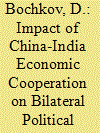

|
|
|
|
|
| Summary/Abstract |
RELATIONS between China and India are affected by a combination of economic and political factors. On one hand, trade between the two countries is marked by positive dynamics, and they interact successfully on issues of global development and multilateral international cooperation. On the other hand, they are military and political rivals and compete for regional economic leadership. Former Indian national security adviser Shivshankar Menon considers Indian-Chinese relations a combination of cooperation and rivalry.
|
|
|
|
|
|
|
|
|
|
|
|
|
|
|
|
| 6 |
ID:
195190


|
|
|
|
|
| Summary/Abstract |
This article develops a theoretical framework on the conditions and mechanisms of informal governance in international organizations by a major power. It argues that the condition for informal governance is that the major power has favourable outside options, i.e. the alternatives that bring about considerable gains in the absence of cooperation, while other countries do not. When conditions are not in place, the major power is unable to exert informal influence. Based on the theoretical lens of the conditions and mechanisms of informal governance by major powers in international organizations, this article assesses China’s influence in the Asian Infrastructure Investment Bank (AIIB). It finds that China’s influence in the AIIB does not remain static. In the early years after the establishment of the AIIB, China was not in a position to exercise informal governance and did not demonstrate influence beyond the confines of the AIIB’s formal rules. As the situation of outside options for European countries worsening and as China’s outside options improving, China became well placed to implement informal governance. Under such circumstances, China’s preferences are well reflected in the AIIB’s decision-making.
|
|
|
|
|
|
|
|
|
|
|
|
|
|
|
|
| 7 |
ID:
167319
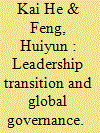

|
|
|
|
|
| Summary/Abstract |
The establishment of the Asian Infrastructure Investment Bank (AIIB) signified China’s ‘charm offensive’ towards multilateral institutions and existing global financial governance. If the rise of China is inevitable, what will the future world look like, and what should other countries be prepared for? Borrowing insights from institutional balancing theory and role theory in foreign policy analysis, this project introduces a ‘leadership transition’ framework to explain policy dynamics in global governance, with the AIIB as a case study. It suggests that China, the United States, and other countries have employed different types of institutional balancing strategies, i.e. inclusive institutional balancing, exclusive institutional balancing, and inter-institutional balancing, to compete for influence and interest in the process of establishing the AIIB. A state’s role identity as a ‘leader’, a ‘challenger’, or a ‘follower’ will shape its policy choices in global governance regarding different institutional balancing strategies in the process of ‘leadership transition.’ Institutional balancing is a new type of balancing among states in the future transformation of global governance. China’s institutional rise in global governance, therefore, might be more peaceful than widely predicted.
|
|
|
|
|
|
|
|
|
|
|
|
|
|
|
|
| 8 |
ID:
181177
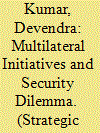

|
|
|
|
|
| Summary/Abstract |
The article attempts to explain India’s contrasting strategic choices with regard to China-led initiatives in South Asia. While India chose to join the AIIB, it has opposed the BRI. While the India–China relationship has been defined by the security dilemma for long, China’s involvement in the region makes the security dimension even more salient. More so, because infrastructure connectivity projects change the existing relations of power and influence. It is argued here that India’s choice to join the AIIB can be explained by its inclusive and transparent governance structures that help decouple China’s strategic intentions from the projects funded by the Bank. In contrast, the BRI does not have inclusiveness and transparency, which stokes India’s security concerns.
|
|
|
|
|
|
|
|
|
|
|
|
|
|
|
|
| 9 |
ID:
144910
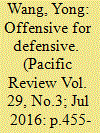

|
|
|
|
|
| Summary/Abstract |
China's Belt and Road initiative came from the combined pressure of slowing down of Chinese economy, US pivot to Asia and deterioration of the relations with neighboring countries after weathering the storm of the Global Financial Crisis of 2008. It also symbolizes a more proactive approach of Chinese new leader Xi Jinping in meeting the expectation on China's international obligation and leadership. Aimed to link Asia, Europe, Africa and Oceania, the initiative provides tremendous opportunities of international economic cooperation. The paper argues that as China's contribution to international public goods, it is in the line of economic liberalism; as China's grand strategy, it is more of defensive than offensive by nature. Despite risks and uncertainties exist, the enforcement will boost China's influence and position in regional and international institutions. US should consider making more strategic space to the rising China, and a better coordinated China–US relations will make Asia Pacific a safer and more promising region.
|
|
|
|
|
|
|
|
|
|
|
|
|
|
|
|
| 10 |
ID:
187975
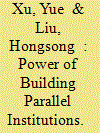

|
|
|
|
|
| Summary/Abstract |
China has been a proponent of global governance reform, but its reform strategy does not remain constant. In the wake of the Global Financial Crisis, its political opportunities were depleting when dominant states, especially the United States, were recovering from the crisis. As a result, the promised 2010 International Monetary Fund (IMF) reform package failed to materialize under Beijing’s old reform strategy of making overt proposals. We argue that Beijing’s goal of the IMF reform was achieved through the creation of the Asian Infrastructure Investment Bank. To advance reform, the newly-created institution needs to have sufficient governance capacity to ensure its effectiveness, produce policy outcomes close to Beijing’s preferences, and operate in an issue area competing for resources with the established institution, the IMF, but not necessarily in the same issue area as is required by the literature of contested multilateralism.
|
|
|
|
|
|
|
|
|
|
|
|
|
|
|
|
| 11 |
ID:
155436
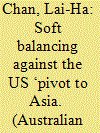

|
|
|
|
|
| Summary/Abstract |
The existing accounts about the China-led multilateral development bank—the Asian Infrastructure Investment Bank (AIIB)—have focused on the USA’s policy concerns and the economic and commercial reasons for China having established it. Two deeper questions are left unaddressed: Was there any strategic rationale for China to initiate a new multilateral development bank and, if so, how effective is China’s strategy? From a neorealist balance-of-power perspective, this article argues that China has felt threatened by the Obama administration’s rebalance to the Asia-Pacific strategy. In response, China is opting for a soft-balancing policy to carve out a regional security space in Eurasia in order to mitigate the threat coming from its east. China’s material power, premised on the fact that the country is a huge domestic market and flush with cash, has proved irresistible for Asian states, with the exception of Japan, to be enticed away from the USA. On the one hand, this article adds weight to the claim that although the USA remains the pre-eminent military power in the Asia-Pacific, it has fallen into a relative decline in regional economic governance; on the other, China’s soft balancing has its own limitations in forming like-minded partnerships with, and offering security guarantees to, AIIB members. A China-led regional order is yet to have arrived, even with the AIIB.
|
|
|
|
|
|
|
|
|
|
|
|
|
|
|
|
|
|
|
|
|